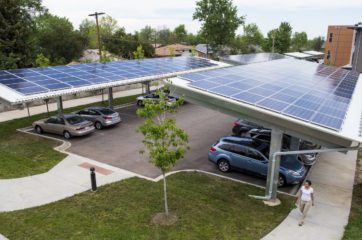In the midst of much talk and overwhelming public attention to the Green New Deal, Congressional Republicans announced a new bicameral caucus that focuses on prioritizing nature-based solutions to environmental challenges. Whether this is a step forward for Republicans in taking a serious policy stance on climate change, or simply a balancing act against the left, remains an open question.
The Roosevelt Conservation Caucus, announced at the Conservative Political Action Conference, will be led in the Senate by Sens. Lindsey Graham (R-SC) and Cory Gardner (R-CO) and in the House by Reps. Elise Stefanik (R-NY) and Brian Mast (R-FL). The main focus of the Caucus will be resolving maintenance backlogs at national parks – which has reached almost $12 billion.
63 percent of adults felt that the GOP’s positions on climate change were outside the mainstream, compared to 54 percent in 2015.
The Caucus, however, will not focus on climate change or put forth any policy related to greenhouse gas emissions reductions. It therefore begs the question of how far Republicans will go without proposing their own meaningful policy proposals to tackle climate change. Many in the GOP have spent too long either ignoring climate change as an issue that needs to be addressed through policy, or worse, actively helping to strip away environmental protections. This has become even more pronounced with a president who decidedly denies climate change and its threats to Americans, as many in the Republican party have been happy to sit on the sidelines as he undos years of progress on climate policies. But we all know this trend won’t last; it simply can’t. In truth, however, if Republicans want to continue bashing Democratic proposals, to do so credibly and remain relevant and viable as a party, these solutions need to come sooner rather than later.
The survival of at least some Republicans in office hinges on this very fact. Nearly 3 in 4 Americans, including Republican voters, now agree that climate change is happening, according to a December poll from the Yale Program on Climate Change Communication. Polling shows the Republican Party’s aversion to acknowledging climate change is increasingly falling out of favor. A Wall Street Journal poll released earlier this year also shows that 63 percent of adults felt that the GOP’s positions on climate change were outside the mainstream, compared to 54 percent in 2015.
Climate concerns are even more prominent among Millennial voters, soon to be the largest voting demographic. It will become increasingly difficult and ultimately impossible for Republicans to keep their seats and win elections without a proposal – even a conservative one – to address climate change.
It was not until the Green New Deal started grabbing national headlines that there has been any sign of interest in making this issue a central talking point for policymakers and federal leaders. The Green New Deal is as ambitious as it is polarizing, and say what you will about the policy, it has at the very least brought the issue into the limelight of political action. A split down party lines on climate action is nothing new, but the type of attacks and the partisan discourse the policy has prompted is unlike anything we have seen in recent years.
Many Republicans and pundits have been quick to use the Deal to unleash innumerable attacks on the left, but criticizing the Green New Deal and cherry picking some of its points to make ridiculous claims about the Democrats’ so-called socialist agenda is not policy, and will soon not be a sufficient talking point. As more moderate liberal candidates like Jay Inslee enter the race for 2020, making climate change front and center in their platforms, Republicans will be increasingly faced with the challenge of putting forward real climate policy for their party.
A letter sent announcing the caucus to members of Congress obtained by the Washington Examiner, states “we believe the path forward must continue to adhere to conservative solutions which are driven by a commitment to innovation, competitive markers, and entrepreneurialism.” In addition to the letter that created the caucus, there are other voices in the Republican party that have emerged with the acknowledgement of the climate crisis and proposals to tackle it.
Many Republicans and pundits have been quick to use the Deal to unleash innumerable attacks on the left, but criticizing the Green New Deal and cherry picking some of its points to make ridiculous claims about the Democrats’ so-called socialist agenda is not policy, and will soon not be a sufficient talking point.
Reps. John Shimkus (R-Illinois), Greg Walden (R-Oregon), and Fred Upton (R-Michigan), argued in a February Op-Ed that while the Green New Deal would have “potentially devastating consequences on our national debt and on our economy”, the problem was real and should be addressed. “We must address climate change in ways that focus on American prosperity and technological capabilities while maintaining America’s leadership in clean and renewable energy innovation,” reads the piece. These members of Congress and their vocal support for climate solutions, as well as the newly created caucus, are welcome developments for the party, which might just have realized the polls were not trending in their favor.
But, is it really possible to be a part of the climate conversation as a Republican without being shunned by the GOP? The jury is still out on that one. Unmissable in this conversation is the special interest and lobbying dollars spent by the oil, gas, and coal industries in GOP candidates’ races. Together, they are some of the most influential donors for Republican candidates, and have undoubtedly had massive influence in D.C.
Oil, gas, and coal lobbyists spent more than $2 billion trying to influence Congress on climate change from 2000 to 2016, with fossil-fuel industry groups outspending environmental groups by 10-1. Before President Trump made the final call to withdraw the U.S. from the Paris Climate Accord, for example, 22 senators wrote him a letter urging him to withdraw from the international agreement. The senators had received more than $10 million from oil and gas in the past 3 election cycles – check a breakdown of donations here from The Guardian.
At the same time, fossil-fuel funded candidates lost 30 seats in the 2018 elections, which brings us back to the fact that while the fossil fuel lobby wants climate deniers in office, the American public does not. Beyond campaign donations and financing, there are deep considerations for members of Congress in terms of climate policy. A large contingency of GOP lawmakers represent states and districts where the fossil fuel industry represents a large pool of employment, which can make up a voter base that strongly opposes climate policies when they are perceived to threaten the future of jobs. The GOP will need to grapple with these challenge in the years to come, and specifically as it gears up for 2020.
There are in fact policy options that both address climate change and align with conservative values. Carbon pricing is among the most widely recognized, and it might just be the one that is able to reach across party lines and bring real bipartisan climate policy. It could serve to reduce greenhouse gas pollution through the very markets conservatives hold so dear.
In fact, just before the GND became central to the policy debate on climate change, there was a bill with bipartisan support making its rounds in D.C. The Energy Innovation and Carbon Dividend Act, aimed to put a price on carbon emissions at the federal level, and was introduced by a small team of Democrats and Republicans, including long-time supporter of the policy Carlos Curbelo, former Rep. from Florida. A fee on carbon emissions is the most effective and feasible policy that can incentivize the move towards a low-carbon future, while raising vital revenue to deal with these transitions and ensure equity in the process.
In the past, the Republican Party has stood for national security and economic growth, but their views and (in)action on climate change are putting those very values at risk.
However, the bill failed, for very much the same reason Republicans have been failing on climate change: the lack of a grandiose vision and ambition. Corny as might be, the greatest American accomplishments have been a result of leaders’ ability to draft a vision for the future that is much greater than the realities of today. In the past, the Republican Party has stood for national security and economic growth, but their views and (in)action on climate change are putting those very values at risk. Constituents are increasingly concerned about the climate issue, and will continue to demand actionable solutions, let’s hope the party can embrace this change and get on board with the rest of us as we try to build a livable future.
Interested in this topic? We have webinar coming up on the conservative case for climate action. You can register here.
Want to learn more about the Green New Deal and what it really means? Check this out.









